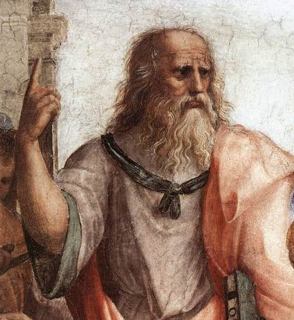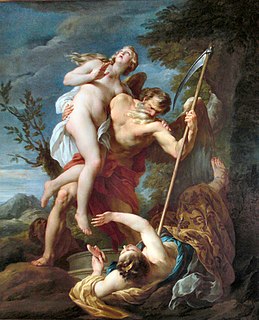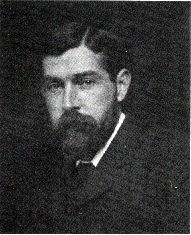
In philosophy, idealism is the diverse group of metaphysical philosophies which asserts that "reality" is in some way indistinguishable or inseparable from human understanding and/or perception; that it is in some sense mentally constituted, or otherwise closely connected to ideas. According to Immanuel Kant, a pioneer of modern idealist thought, idealism does “not concern the existence of things”, but asserts only that our “modes of representation” of them, above all space and time, are not “determinations that belong to things in themselves” but essential features of our own minds. Kant called this position “transcendental” and “critical” idealism, since it describes the way in which "reality" is utterly transcended by, and cannot be thought separate from, the categories with which they are structered by and in human understanding.
Postmodern philosophy is a philosophical movement that arose in the second half of the 20th century as a critical response to assumptions allegedly present in modernist philosophical ideas regarding culture, identity, history, or language that were developed during the 18th-century Enlightenment. Postmodernist thinkers developed concepts like difference, repetition, trace, and hyperreality to subvert "grand narratives", univocity of being, and epistemic certainty. Postmodern philosophy questions the importance of power relationships, personalization, and discourse in the "construction" of truth and world views. Many postmodernists appear to deny that an objective reality exists, and appear to deny that there are objective moral values.
Platonic idealism usually refers to Plato's theory of forms or doctrine of ideas. It holds that only ideas encapsulate the true and essential nature of things, in a way that the physical form cannot. We recognise a tree, for instance, even though its physical form may be most untree-like. The treelike nature of a tree is therefore independent of its physical form. Plato's idealism evolved from Pythagorean philosophy, which held that mathematical formulas and proofs accurately describe the essential nature of all things, and these truths are eternal. Plato believed that because knowledge is innate and not discovered through experience, we must somehow arrive at the truth through introspection and logical analysis, stripping away false ideas to reveal the truth.

Truth is most often used to mean being in accord with fact or reality, or fidelity to an original or standard. Truth is also sometimes defined in modern contexts as an idea of "truth to self", or authenticity.
Coherentism is the name given to a few philosophical theories in modern epistemology. There are two distinct types of coherentism. One is the coherence theory of truth; the other, the coherence theory of justification.

A subset of absolute idealism, British idealism was a philosophical movement that was influential in Britain from the mid-nineteenth century to the early twentieth century. The leading figures in the movement were T. H. Green (1836–1882), F. H. Bradley (1846–1924), and Bernard Bosanquet (1848–1923). They were succeeded by the second generation of J. M. E. McTaggart (1866–1925), H. H. Joachim (1868–1938), J. H. Muirhead (1855–1940), and R. G. Collingwood (1889–1943). The last major figure in the tradition was G. R. G. Mure (1893–1979). Doctrines of early British idealism so provoked the young Cambridge philosophers G. E. Moore and Bertrand Russell that they began a new philosophical tradition, analytic philosophy.

Francis Herbert Bradley was a British idealist philosopher. His most important work was Appearance and Reality (1893).
Objective idealism is an idealistic metaphysics that postulates that there is in an important sense only one perceiver, and that this perceiver is one with that which is perceived. One important advocate of such a metaphysics, Josiah Royce, wrote that he was indifferent "whether anybody calls all this Theism or Pantheism". It is distinct from the subjective idealism of George Berkeley, and it abandons the thing-in-itself of Kant's dualism.
In metaphysics and philosophy of language, the correspondence theory of truth states that the truth or falsity of a statement is determined only by how it relates to the world and whether it accurately describes that world.
Percy Brand Blanshard was an American philosopher known primarily for his defense of reason and rationalism. A powerful polemicist, by all accounts he comported himself with courtesy and grace in philosophical controversies and exemplified the "rational temper" he advocated.
Timothy Lauro Squire Sprigge, usually cited as T. L. S. Sprigge, was a British idealist philosopher who spent the latter portion of his career at the University of Edinburgh, where he was Professor of Logic and Metaphysics, and latterly an Emeritus Fellow.

Nicholas Rescher is a German-American philosopher, polymath, and author, teaching at the University of Pittsburgh. He is the Chairman of the Center for Philosophy of Science and has formerly served as Chairman of the Philosophy Department.
In metaphysics, realism about a given object is the view that this object exists in reality independently of our conceptual scheme. In philosophical terms, these objects are ontologically independent of someone's conceptual scheme, perceptions, linguistic practices, beliefs, etc.
Harold Henry Joachim was a British idealist philosopher. A disciple of Francis Herbert Bradley, whose posthumous papers he edited, Joachim is now identified with the later days of the British idealist movement. He is generally credited with the definitive formulation of the coherence theory of truth, in his book The Nature of Truth (1906). He was also a scholar of Aristotle and Spinoza.
In the philosophy of language, the nature of meaning, its definition, elements, and types, was discussed by philosophers Aristotle, Augustine, and Aquinas. According to them "meaning is a relationship between two sorts of things: signs and the kinds of things they mean ". One term in the relationship of meaning necessarily causes something else to come to the mind. In other words: "a sign is defined as an entity that indicates another entity to some agent for some purpose". As Augustine states, a sign is "something that shows itself to the senses and something other than itself to the mind".
The following outline is provided as an overview of and topical guide to metaphysics:
Objectivity is a philosophical concept of being true independently from individual subjectivity caused by perception, emotions, or imagination. A proposition is considered to have objective truth when its truth conditions are met without bias caused by a sentient subject. Scientific objectivity refers to the ability to judge without partiality or external influence, sometimes used synonymously with neutrality.
In philosophy, the Absolute is "the sum of all being, actual and potential". In monistic idealism, it serves as a concept for the "unconditioned reality which is either the spiritual ground of all being or the whole of things considered as a spiritual unity.

John McTaggart Ellis McTaggart (1866–1925) was an English idealist metaphysician. For most of his life McTaggart was a fellow and lecturer in philosophy at Trinity College, Cambridge. He was an exponent of the philosophy of Georg Wilhelm Friedrich Hegel and among the most notable of the British idealists. McTaggart is known for "The Unreality of Time" (1908), in which he argues that time is unreal. The work has been widely discussed through the 20th century and into the 21st.

Appearance and Reality is a book by the English philosopher Francis Herbert Bradley, in which the author, influenced by Georg Wilhelm Friedrich Hegel, argues that most things are appearances and attempts to describe the reality these appearances misrepresent, which Bradley calls the Absolute. It is the main statement of Bradley's metaphysics and is considered his most important book. The work was an early influence on Bertrand Russell, who, however, later rejected Bradley's views.







